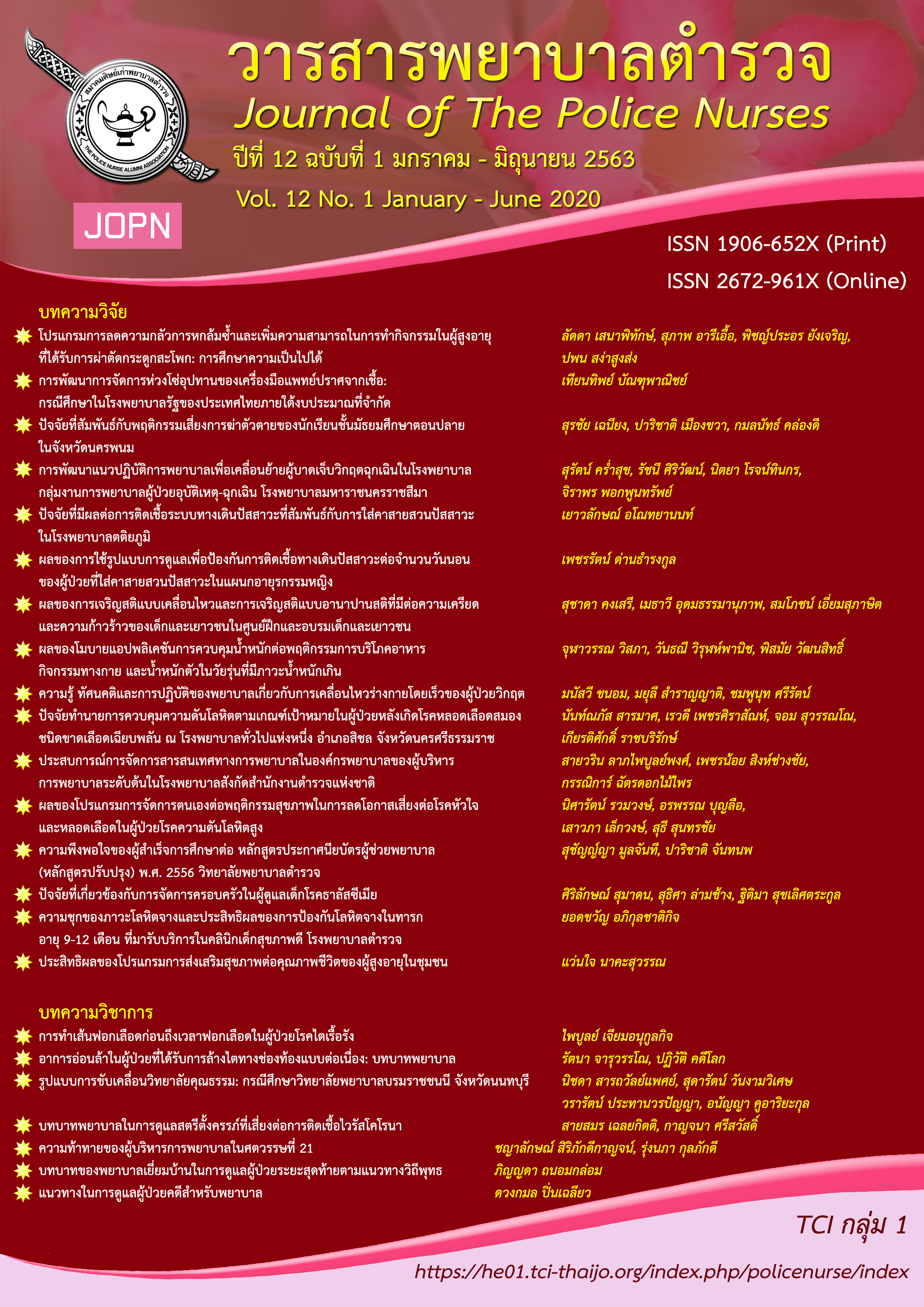EFFECTS OF WEIGHT CONTROL MOBILE APPLICATION ON FOOD CONSUMPTION BEHAVIOR, PHYSICAL ACTIVITY, AND BODY WEIGHT IN OVERWEIGHT ADOLESCENTS
Keywords:
weight control mobile application, overweight adolescentsAbstract
This quasi-experimental research, namely two-group pretest-posttest design, aimed to study the effects of a weight control mobile application on food consumption behavior, physical activity, and the body weight of overweight adolescents. Multi-stage random sampling was used to obtain a control group (n = 48) and an experimental group (n = 48), in which each sampled their matched in another group who had the same gender and age. The experimental group received the weight control mobile application for a period of 8 weeks. Research instruments were 1) a weight control mobile application, 2) a weight control mobile application handbook, 3) a demographic data questionnaire, and 4) a food consumption behavior questionnaire. Demographic data were analyzed using descriptive statistics which were Chi-square, paired t-test, independent t-test, Wilcoxon test and Mann-Whitney U-test.
The results revealed as followed: The mean score of food consumption behavior after the intervention between the experimental and the control group was not significantly different (t = -1.00, p = .32). The mean rank score of physical activity after the intervention in the experimental group was significantly higher than that of the control group (z = -3.73, p = .00), and the mean score of the body weight after the intervention in the experimental group was significantly lower than that of the control group (t = 3.20, p = .00).
The weight control mobile application may help overweight adolescents in school to have better food consumption and physical activity behaviors, which in turn then reduces their weights. Therefore, schools should adopt this weight control mobile application to control the body weight in overweight adolescents at school or outside school.
Downloads
References
Andrade, A. M., Coutinho, S. R., Silva, M. N., Mata, J., Vieira, P. N., Minderico, C. S., . . .Teixeira, P. J. (2010). The effect of physical activity on weight loss is mediated by eating self-regulation. Patient Education and Counseling, 79(3), 320-326.
Bandura, A. (1986). Social foundations of thought and action: A social cognitive theory. Englewood Cliffs, NJ: Prentice Hall.
Bureau of Policy and Strategy. (2017). Template key performance indicator ministry of public health 2017. Retrieved from http://www.lpho.go.th/letsgo/attachments/article/1164/pa20year_03-11-2559_11.23.pdf
Burke, L. E., Conroy, M. B., Sereika, S. M., Elci, O. U., Styn, M. A., Acharya, S. D., . . . Glanz, K. (2011). The effect of electronic self-monitoring on weight loss and dietary intake: A randomized behavioral weight loss trial.. Obesity, 19(2), 338-344. doi:10.1038/oby.2010.208.
Chaingkuntod S., Mattavangkul C., Chancharoen K., Hongkrailert N., Romnukul N., Udomsri T., . . . Ngoamoon. (2012). Knowledge and behavior on food consumption of Pasicharoen persons. (Research report). The Thailand research fund.
Chatpreecha, P. (2016). The mobile application introduction to information of Panyapiwat Institute of Management on android operating system. Panyapiwat Journal, 8(1), 237-249.
Gokee-LaRose, J., Gorin, A. A., & Wing, R. R. (2009). Behavioral self-regulation for weight loss in young adults: A randomized controlled trial. International Journal of Behavioral Nutrition and Physical Activity, 6(1), 1-9.
Griffiths, L. J., Parsons, T. J., & Hill, A. J. (2010). Self-esteem and quality of life in obese children and adolescents: A systematic review. International Journal of Pediatric Obesity, 5(4), 282-304. doi:10.3109/17477160903473697
Ministry of Public Health, Department of Health, Bureau of Nutrition. (2016). Smart kids coacher. Nonthaburi: Samcharoenpanich.
Nudla, P., Jittanoon, P., & Balthip, K. (2017). Impact of an internet-mediated over-consumption self-reminding programme on the body weight and consumption behaviour of overnutrition adolescents. Thai Journal of Nursing Council, 32(1), 32-64.
Oliver, E., Banos, R. M., Cebolla, A., Lurbe, E., Alvarez-Pitti, J., & Botella, C. (2013). An electronic system (PDA) to record dietary and physical activity in obese adolescents: Data about efficiency and feasibility. Nutricion Hospitalaria, 28(6), 1860-1866. doi:10.3305/nh.2013.28.6.6784
Patrick, K., Marshall, S. J., Davila, E. P., Kolodziejczyk, J. K., Fowler, J. H., Calfas, K. J., . . . Merchant, G. (2014). Design and implementation of a randomized controlled social and mobile weight loss trial for young adults (project SMART). Contemporary Clinical Trials, 37(1), 10-18.
Pichainarong, N., Mahaweerawat, U., Chaelinfa, K., khamkodsoon, J., Prarop, P., Kamsorn, W., & Faonongdu, S. (2012). Exercise, diet and supplementary food Product to reduce weight among female undergraduate students, department of performing arts, faculty of fine arts and applied arts, Mahasarakham University. Journal of Science and Technology Mahasarakham University, 32(2), 213-219.
Pleankham, P., Keiwkarnka, B., & Punpinij, S. (2010). The development of an over-weight control program for lower-secondary level students in Phetchaburi Province. The Journal of Public Health and Development, 8(2), 186-200.
Rattanachuek, S. (2015). Pediatic nutrition handbook. Bagkok: Chaicharoen.
Reilly, J., & Kelly, J. (2011). Long-term impact of overweight and obesity in childhood and adolescence on morbidity and premature mortality in adulthood: Systematic review. International Journal of Obesity, 35, 891–898.
Suksananl, P., Bchobtrong, S., & Pranprawit, A. (2016). Effects of a weight reduction program with application of self-regulations and social support among village health volunteers. The Southern College Network Journal of Nursing and Public Health, 3(1), 46-59.
Downloads
Published
How to Cite
Issue
Section
License
ผลงานที่ได้ตีพิมพ์แล้วจะเป็นลิขสิทธิ์ของวารสารพยาบาลตำรวจ















